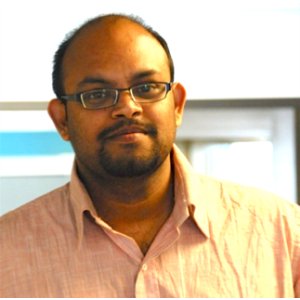
Dr. Samiran Ganguly
Senior Research Scientist
Electrical and Computer Engineering Department
College of Engineering
Samiran Ganguly, PhD.
Dr. Samiran Ganguly, is a Senior Research Scientist in the College of Engineering at Virginia Commonwealth University. Previously he was a Researcher at University of Virginia. His Ph.D. in Electrical and Computer Engineering was from Purdue University under the supervision of Supriyo Datta, and his B.Technology in Electronics Engineering was from the Indian Institute of Technology, Dhanbad. He is a Senior Member of IEEE and Member of APS and SPIE.
His current principal research focus is on building a quantum-to-classical full stack simulation platform that works as a playground for exploratory blended designs using a variety of quantum, classical, and alternate state variable materials for logic, memory, and sensing applications. Specifically he is working on building a quantum dynamical simulator that is specialized for next-generation photon detectors that deploy nanostructures, such as superlattices and 2D materials. He is also building a platform that enables classical SPICE circuit simulators to simulate circuits and systems built from a blend of hybrid-CMOS and quantum devices. He has already successfully built a "subset of the platform" for spintronic, nano-magnetic, memristive, and photonic devices for co-simulation with conventional state-of-the-art Si device models. This platform is now being extended to include mainstream superconducting and topological qubits for quantum information systems including quantum computing and quantum sensing. Such an integrated simulation allows for detailed capture of system behavior metrology such as energetics, dissipation, dynamical range, error rates, performance benchmarking, and discovery of possible system optimization paths. This platform allows for rapid prototyping and analysis for fast developing emerging technologies.
He also has active research interest in neuromorphic systems focused on the autonomous edge signal-processing and sensory-motor applications. His focus in particular is on exploring and evaluating the computational capabilities of the reservoir computing paradigm, its application space, and its practical physical implementation. He is also exploring hardware implementation possibilities in hierarchical models of long-term "semantic" memory formation via lifelong learning mechanisms that avoid catastrophic forgetting and reset. These forms of long-term memories embedded in edge devices will allow truly autonomous systems like robots that can integrate information without any cloud support or dependence.He has over 80 published works and presentations in the form of journals, international conferences, book chapters, invited talks, and open source software packages and tools. He is a regular referee for top journals in his areas of expertise, and has served as program chair and in the technical program committees in various IEEE and SPIE conferences.
